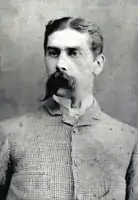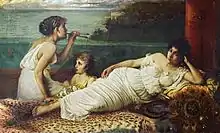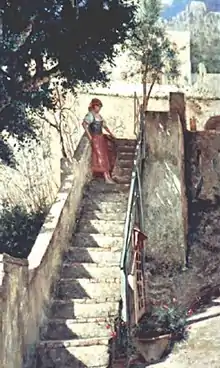Frank Hyde (painter)
Frank Hyde (1849–1937) was a British portrait and figure painter. He was a war artist and portrait painter, best known for his works of Capri. He also created comic characters for greeting cards for Raphael Tuck.[1]
Frank Hyde | |
|---|---|
 Frank Hyde in 1878 | |
| Born | 1849 London, England |
| Died | 4 September 1937 (aged 87) |
| Nationality | British |
| Known for | Painting |
Early life and education
Frank Hyde was born in Surrey to a gentleman who retired from the army,[1] Captain John Francis, and Elizabeth Gudge Hyde[2] in 1849. His father inherited Hyde End Manor, the family seat and a 1,500-acre estate in Berkshire,[1][2] where he grew up with five brothers.[2]
Hyde studied[1] and exhibited his works of art in London at the Royal Academy of Arts.[2] Later, Hyde inherited Hyde End Manor and later sold it.[1]
Career
During the Franco-Prussian War of 1870–71, he served the Royal Engineers as a 1st Lieutenant and then began created illustrations for The Graphic, working as a war artist.[1] Battle of Sedan was depicted by Hyde for The Graphic.[2]

In the late 1870s, he purchased a villa[1] or the former Santa Teresa monastery at Anacapri on the island of Capri, where he made portraits of local model Rosina Ferrara and became a friend of John Singer Sargent.[3] In 1914, he wrote the article Island of the Sirens about Capri for the International Studio about the allure of the people, culture, and island for artists over the years.[4] It was one of many travel articles written by Hyde.[2][5]

He is likely best known for his paintings of Ferrara and the one entitled Capri.[1] In the late 1880s, he made the painting The Eton Boy.[6]
During World War I, Hyde was a Captain[1] and made paintings of the war, including First Battalion, the Royal West Kent, at Neuve Chapelle, 1914.[2] An exhibit about the war, "Coming Home: Conflict & Care", at Maidstone Museum has shown three of his paintings, including Arrival of a Convoy of Wounded Soldiers at Maidstone East and Trones Wood, about the Queen's Own Royal West Kent Regiment.[1][7][8]
His painting, Bugler Timmins RM, The Boy Hero,[9] about 14-year-old World War I hero Charles Timmins of HMS Chatham,[2] in the collection of Napier Road School is on loan to the Historic Dockyard in Chatham.[9] Tug of War (1891) is in the collection of the Salford Museum and Art Gallery of Manchester.[10] Capri Coastal Scene with Some Figures and Arrival of a Convoy of Wounded Soldiers at Maidstone East (1917) and in the collection of Maidstone Museum.[11]
Personal life
In November 1876, Hyde was married to Constance Mary Louise Felgate, who died within a year.[1][2] In 1881, he married Florence Ellen Louise Rowley. In a year, they had a daughter named Mina and in 1884 had a son, Francis Angerstein Clarendon Rowley-Hyde.[1][2] The couple divorced in 1887 and Florence died three years later.[1]
Since the 1870s, Hyde travelled extensively.[1] He then lived in Pett Wood Cottage, his final residence in England at Stockbury, Kent. He lived there for the rest of his life.[1] He died while living there on 4 September 1937 and was buried on Sutton Road at the Maidstone Cemetery.[1]
References
- "Frank Hyde". Maidstone Museum. Retrieved 1 May 2017.
- "Man behind the painting of injured soldiers' return". Kent Messenger Maidstone. 19 December 2014. Retrieved 8 April 2017.
- "A Capriote". Museum of Fine Arts, Boston. Retrieved 1 May 2017.
- "Island of the Sirens". The International Studio. New York Offices of the International Studio. 1914. pp. 285–288.
- Frank Hyde (1912). "Anticoli Corrado, A Town of Models". International Studio. New York Offices of the International Studio. pp. 219–223.
- Alison Smith (2001). Exposed: The Victorian Nude. Tate Publishing. p. 179. ISBN 978-1-85437-372-4.
- "Coming Home: Conflict & Care". Maidstone Museum. Retrieved 1 May 2017.
- Angela Cole (8 November 2016). "Maidstone Museum exhibition: First World War paintings by Frank Hyde". KentOnline. Retrieved 1 May 2017.
- "Bugler Timmins RM, The Boy Hero". Art UK. Retrieved 1 May 2017.
- "Tug of War". Art UK. Retrieved 1 May 2017.
- "Search: Frank Hyde". Art UK. Retrieved 1 May 2017.